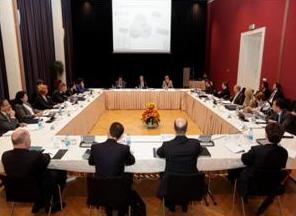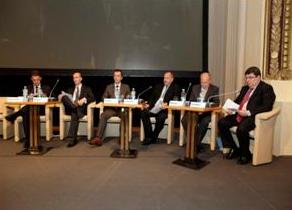Posted by Brian Olden and Tina Zagar 1/

The Center of Excellence in Finance (CEF), the regional training center for public sector officials in South East Europe this year celebrated its 10th anniversary with a series of events that took place in Ljubljana between June 20 and 24, 2011. The CEF was established in January 2001 by the Slovenian Government in close cooperation with ministries of finance of other countries in South East Europe. The initiative to establish the CEF was framed in the context of the Stability Pact for South East Europe. The CEF’s main objective is to assist in development of public financial management and central banking capacity through provision of training and other capacity development initiatives for countries in the region.
In addition to its annual Advisory and Supervisory Board meetings, representing donor partner institutions and member countries respectively, other events celebrating CEF’s 10th anniversary included an IMF seminar on Building Fiscal Institutions to Meet Post Crisis Challenges sponsored by the Japanese government and a Roundtable Discussion on the Economic Outlook and the Role of Public Finances in the South East Europe (SEE).2/ The celebrations culminated with the CEF’s 10th Anniversary Reception on June 23rd, followed by a Regional Policy Forum on ‘Growth Strategies after the Crisis’ the next day.
The key issues addressed by the Advisory Board meeting included the government decision to approve the switch in status of the CEF from a Slovenian to an international organization and the need to remain demand driven, flexible to member country needs and to focus their activities of the CEF on the SEE area and Central Asia to ensure that the limited resources available to the CEF could be most effectively utilized. The Advisory Board also enthusiastically supported recent efforts to improve monitoring and evaluation systems related to delivery of the CEF’s program and the intention to improve these systems further. The 2011 Supervisory Board meeting was attended by ministers, governors and their representatives from the following member countries; Albania, Bosnia and Herzegovina, Croatia, Kosovo, Macedonia, Moldova, Montenegro, Slovenia, and Turkey.
 One of the key issues that was discussed was the need ensure that a stable financing mechanism be pursued to ensure the continuity of the regional technical assistance program coordinated with the IMF and the Supervisory Board strongly supported a motion to encourage the European Commission to provide financing to facilitate the strengthening of fiscal institutions for EU candidate and potential candidate countries.
One of the key issues that was discussed was the need ensure that a stable financing mechanism be pursued to ensure the continuity of the regional technical assistance program coordinated with the IMF and the Supervisory Board strongly supported a motion to encourage the European Commission to provide financing to facilitate the strengthening of fiscal institutions for EU candidate and potential candidate countries.
Over one hundred participants and guests attended the Regional Policy Forum on Growth Strategies after the Crisis. Panelists included representatives of international financial and development institutions along with ministers of finance and governors of central banks of CEF's twelve member countries present their experience with the crisis and upcoming challenges. Representatives of international institutions included Philippe Le Houérou (The World Bank), Thomas Mirow (European Bank for Reconstruction and Development), Anton Rop (European Investment Bank) and Gerd Schwartz (International Monetary Fund).
 Mr. Schwartz, a Senior Advisor from the IMF's Fiscal Affairs Department, gave a presentation on the impact of the recent crisis on economies in the region. He highlighted that CEF countries contracted slightly more than other Central European countries, primarily due to the need for a relatively larger current account adjustment. He also pointed out that appropriate countercyclical policies were implemented, in the main, but that this did cause debt levels to increase in the region, albeit some way below the levels witnessed in the Eurozone. In terms of future fiscal consolidation needs, he indicated that planned adjustments in CEF and surrounding countries were far lower than required to ensure fiscal sustainability over the longer-term. He also pointed out that there were a number of risks, including spillover effects from a continued deterioration in the international situation, and in particular the impact of shocks from neighboring countries, possible political constraints on implementing fiscal adjustments and, importantly, inadequate fiscal institutions.
Mr. Schwartz, a Senior Advisor from the IMF's Fiscal Affairs Department, gave a presentation on the impact of the recent crisis on economies in the region. He highlighted that CEF countries contracted slightly more than other Central European countries, primarily due to the need for a relatively larger current account adjustment. He also pointed out that appropriate countercyclical policies were implemented, in the main, but that this did cause debt levels to increase in the region, albeit some way below the levels witnessed in the Eurozone. In terms of future fiscal consolidation needs, he indicated that planned adjustments in CEF and surrounding countries were far lower than required to ensure fiscal sustainability over the longer-term. He also pointed out that there were a number of risks, including spillover effects from a continued deterioration in the international situation, and in particular the impact of shocks from neighboring countries, possible political constraints on implementing fiscal adjustments and, importantly, inadequate fiscal institutions.
In touching on the issue of fiscal institutions, Mr. Schwartz stressed the importance of the IMF's technical assistance programs, which in his opinion are often overlooked when discussing the role of the IMF in the region. The IMF has been very active in assisting countries to strengthen their fiscal institutions and this advisory work is seen as a key pillar in helping economies to emerge from the crisis. Mr. Schwartz praised the ongoing cooperation between the IMF and the CEF in developing public financial management capacity in the region.
The IMF has been working with the Center of Excellence in Finance for a number of years and has had a resident advisor in place since 2005 to assist SEE countries in their efforts to strengthen public financial management. The PFM advisor has been funded under a Japanese government sponsored program to Strengthen Fiscal Management in South East Europe. This program has also funded a second advisor, working on strengthening revenue administration practices, since the beginning of 2011.
==================================================================================
1/Brian Olden is the IMF’s Regional Public Financial Management Advisor for South East Europe. Tina Zagar is a Project Manager at the Center of Excellence in Finance.
2/The Fiscal Institutions seminar was described more fully in a July 8, 2011 blog post.
Note: The posts on the IMF PFM Blog should not be reported as representing the views of the IMF. The views expressed are those of the authors and do not necessarily represent those of the IMF or IMF policy.





